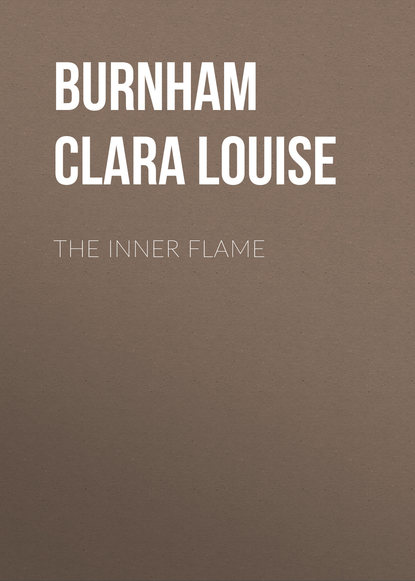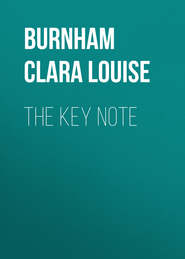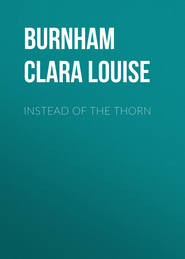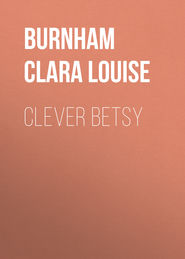По всем вопросам обращайтесь на: info@litportal.ru
(©) 2003-2024.
✖
The Inner Flame
Настройки чтения
Размер шрифта
Высота строк
Поля
The Inner Flame
Clara Burnham
Clara Louise Burnham
The Inner Flame
CHAPTER I
A NOVEMBER NIGHT
Soft snowflakes whirled around the lonely mountain cabin under a November sky. The wind that had rushed up the valley sighing and groaning between the wooded walls, now roared its wild delight in the freedom of the heights. The twilight was deepening fast. Two women were alone in the cabin. The one who was at home stooped and put another log on the blazing fire. The other could not have stooped, no matter how willing her spirit, so straitly and fashionably was her ample figure bound by artful bone and steel.
"Mercy, Mary!" she ejaculated, standing stock still in the middle of the room, fixed there by a triumphant shriek of the rioting wind. "I never had the least desire to go up in an aeroplane. Are you well anchored here?"
"Like a lichen on a rock," returned Mary Sidney, smiling. "Take off your hat, Isabel, and be comfy."
"Do you think we must stay all night?" demurred the visitor. "You know I love you, Mary, and if that wind would just let us hear ourselves think, I wouldn't ask anything better than an evening's chat with you alone."
"You wouldn't as it is," returned Mrs. Sidney soothingly, approaching her cousin and unpinning the veil which Mrs. Fabian had not raised. The visitor clung to her wraps with the feeling that an entire readiness to flee back to the haunts of men would aid her to depart. Mary Sidney's calm amused smile carried some reassurance. It flickered across her face as the firelight flickered across the dark rafters above.
"I told Henry I thought the sky looked threatening before we left town," declared the guest while she submitted to the gentle touch, "but nothing would do but that he should visit the mine this very afternoon. Isn't this fearful, Mary?" as a renewed gust shook the firelit rafters until they creaked heavily.
"Oh, no, this sounds a great deal worse than it is," was the response.
"You're comforting me, I know you are"; and Mrs. Fabian, denuded of her correct hat, permitted herself to take the offered chair by the fire. "I hope, though, that you have a kennel of St. Bernard dogs in the back yard. I should like to see Henry again, bad as he is!"
Mrs. Sidney took the other chair and rolled a blazing log to a better position.
"You'll see the men coming along in a little while – when they grow hungry," she returned placidly.
"And how in the world do you get servants up here?" demanded the other.
"We don't. We could get a Chinaman, but if we had him we'd have to amuse him, there's no one else for him to talk to, so we go without."
"Horrors!" ejaculated Mrs. Fabian with solemn repugnance. "And you live here alone!"
The hostess laughed at her tone. "Not enough of the year to dislike it. One learns a lot of things in these hills – bidding farewell to time, for instance. You see a man with a gun tramping through the valley and you rush to the door, and cry out, 'Hey, there, you with the gun, what day is this?' and the man turns and shouts back, 'You can't prove it by me!'"
Mrs. Sidney laughed again and her cousin shuddered.
"Thank God for civilization!" ejaculated the latter devoutly; then, as the window-glass sucked in and out with a cracking sound, "Give me my hat, Mary," she said, sitting up. "If we're going down the mountain-side, let's go decently and in order."
"For shame, you Maine woman!" was the laughing rejoinder. "Your sea-captains would call this 'a breeze o' wind!' That's all. That's another thing one becomes acquainted with up here: the wind. I didn't know anything about it when I came. You should be here some nights if you call this a storm! I used to set my dish-pans out at the door; but when a few had whirled down the mountain-side into the valley, I learned caution. One can't go around the corner here and buy a dish-pan."
"Mary," Mrs. Fabian eyed her with bewildered admiration, "you're wonderful! You didn't used to be wonderful," she added in an argumentative tone. "Once you'd have made just as much fuss about this as I would. You remember – if you try, you'll remember perfectly – that I warned you, more than twenty-five years ago, not to marry a mining engineer. I told you then it was just as bad as marrying an army officer. There would be no repose about it, and no comfort. You see I was right. Here we are, to all intents and purposes, in a shrieking balloon, and you call it home!" The speaker kept a watchful eye on the rattling casement and drew herself up with renewed tension at each wind blast, but nevertheless she talked on.
"With it all you haven't as many lines in your face as I have, and your hair is as brown as ever. Mine would be white if I lived here instead of in New York. And the calmness of your eyes, and your smile! Tell me, Mary, tell me now honestly, – I shall sympathize with you, —is it the calmness of despair?"
Mary Sidney did not smile. She looked into the depths of the fire and her guest wondered what memories were unfolding themselves to her rapt vision.
"No," she answered simply at last, "such calmness as I possess is not of despair, but of – faith." The speaker paused before the utterance of the last word as if hesitating for the one which should best express her meaning.
"Do you mean something religious?" asked Mrs. Fabian stiffly.
The stiffness was not disapproval. It was owing to the divided attention she was bestowing upon the storm, lest if she took her mind off the wind it might seize the advantage and hurl the cabin from its moorings.
"I should think a person would have to be religious here," she went on. "You must be reduced – simply reduced to trusting in Providence!"
Mary Sidney smiled at the fire. "I didn't have a trusting disposition. I didn't have even a happy disposition, as you evidently remember."
"Well," returned Isabel, "it wasn't a bad one: I didn't imply anything like that; but you were one of the spoiled-beauty sort of girls, not a bit cut out for hardship," the speaker looked judicially at the once familiar face, softened from its old brilliancy. "What an advantage it is to have beautiful eyes!" she added bluntly. "They don't desert you when other things go; – not that it matters a bit what sort of eyes a woman has, living the life you have."
"Oh, Allan thinks it does," returned Mary in her restful manner.
"Does he appreciate you?" Mrs. Fabian asked the question almost angrily.
Mrs. Sidney smiled. "We don't talk much about that, but we're better companions, happier, dearer, than we were twenty-five years ago."
Her cousin gazed curiously. "Then it did turn out all right. You've written so little to your friends. How could your relatives tell?"
"You see, now, why," returned the other. "There's not much letter-material here, and even when we're living in town, all our friends and our pursuits are so foreign to the people at home. Little by little one gets out of the way of writing."
"Don't you ever long for Fifth Avenue?" asked Mrs. Fabian suddenly, her cousin's exile impressing her more and more as utter forlornity.
"Oh, no, not for many years."
"You never could have kept your figure there as you have here," admitted the other in a spirit of justice. "I must say that," and the speaker composed her own rigid armor into a less uncomfortable position.
"Do your own housework, Isabel," advised the hostess with a smile.
"Heavens! it is too late to talk to me about that. I've enough to do without housework, I should hope. You've no idea how much worse things have grown in twenty-five years, Mary. A woman has so much on her mind now that nothing but regular massage from the crown of her head to her heels will offset it. The modistes and milliners are in a conspiracy to change styles so often that it takes active thought to keep abreast of them. Then you no sooner settle down really to learn Bridge, for instance, and feel that you can hold your own, than everybody begins playing Auction! And to know what people are talking about at luncheons you must see plays, and skim through books, reading at least enough so you can express an opinion; not that anybody listens. They all talk at once, their one and only object seems to be to get their own ideas out of their systems. I was glad to send Kathleen off to school. It does seem as if the girls had to go to college to escape as great a rush as we grownups live in. Then when they come back, having had another environment for four years, they adjust themselves to their own homes with such a sense of superiority that it makes you tired; that's what it does, Mary, tired. I've had a taste of it this summer. Kathleen has another year to go, but already she is perfectly changed. She cares no more for my advice, I assure you, than if I had just come down from Mars and had no judgment as to the things of this world. She's well-bred, of course, – I hope no daughter of mine could be less than well-bred, – but when I give her directions, or try to guide her in any way, there's a twinkle in her eye that I resent, Mary, I resent it distinctly. So there you are!" Mrs. Fabian gestured with a perfectly kept hand whereon a blazing gem flashed in the firelight. "There we are between Scylla and Charybdis. We either have to send our girls to college and let the little upstarts think they've outgrown us, or else have them rushed to death at home, keep them up on tonics, and let them sleep till noon!"
With this dismal peroration Mrs. Fabian sat as far back in her chair as disciplined adipose would permit, and shuddered again at the wind.
"Is a son an easier proposition then, in that madding crowd of yours?"
"A boy does seem to have his life more plainly mapped out than a girl. Edgar is in his father's office." The speaker sighed unconsciously. "What is your boy like, Mary?"
Mrs. Sidney kept silence for a thoughtful moment before answering.
"He is like Pegasus harnessed to a coal-wagon," she said at last slowly.
"How very extraordinary. What do you mean?"
Instead of replying, Mrs. Sidney went to a table in the far corner of the cabin and brought therefrom a portfolio which she opened on the chair beside her guest.
A mass of sketches was disclosed, – charcoal, water-color, oil. Mrs. Sidney lifted one, and held it before the other's eyes.
Mrs. Fabian raised her lorgnette.
Clara Burnham
Clara Louise Burnham
The Inner Flame
CHAPTER I
A NOVEMBER NIGHT
Soft snowflakes whirled around the lonely mountain cabin under a November sky. The wind that had rushed up the valley sighing and groaning between the wooded walls, now roared its wild delight in the freedom of the heights. The twilight was deepening fast. Two women were alone in the cabin. The one who was at home stooped and put another log on the blazing fire. The other could not have stooped, no matter how willing her spirit, so straitly and fashionably was her ample figure bound by artful bone and steel.
"Mercy, Mary!" she ejaculated, standing stock still in the middle of the room, fixed there by a triumphant shriek of the rioting wind. "I never had the least desire to go up in an aeroplane. Are you well anchored here?"
"Like a lichen on a rock," returned Mary Sidney, smiling. "Take off your hat, Isabel, and be comfy."
"Do you think we must stay all night?" demurred the visitor. "You know I love you, Mary, and if that wind would just let us hear ourselves think, I wouldn't ask anything better than an evening's chat with you alone."
"You wouldn't as it is," returned Mrs. Sidney soothingly, approaching her cousin and unpinning the veil which Mrs. Fabian had not raised. The visitor clung to her wraps with the feeling that an entire readiness to flee back to the haunts of men would aid her to depart. Mary Sidney's calm amused smile carried some reassurance. It flickered across her face as the firelight flickered across the dark rafters above.
"I told Henry I thought the sky looked threatening before we left town," declared the guest while she submitted to the gentle touch, "but nothing would do but that he should visit the mine this very afternoon. Isn't this fearful, Mary?" as a renewed gust shook the firelit rafters until they creaked heavily.
"Oh, no, this sounds a great deal worse than it is," was the response.
"You're comforting me, I know you are"; and Mrs. Fabian, denuded of her correct hat, permitted herself to take the offered chair by the fire. "I hope, though, that you have a kennel of St. Bernard dogs in the back yard. I should like to see Henry again, bad as he is!"
Mrs. Sidney took the other chair and rolled a blazing log to a better position.
"You'll see the men coming along in a little while – when they grow hungry," she returned placidly.
"And how in the world do you get servants up here?" demanded the other.
"We don't. We could get a Chinaman, but if we had him we'd have to amuse him, there's no one else for him to talk to, so we go without."
"Horrors!" ejaculated Mrs. Fabian with solemn repugnance. "And you live here alone!"
The hostess laughed at her tone. "Not enough of the year to dislike it. One learns a lot of things in these hills – bidding farewell to time, for instance. You see a man with a gun tramping through the valley and you rush to the door, and cry out, 'Hey, there, you with the gun, what day is this?' and the man turns and shouts back, 'You can't prove it by me!'"
Mrs. Sidney laughed again and her cousin shuddered.
"Thank God for civilization!" ejaculated the latter devoutly; then, as the window-glass sucked in and out with a cracking sound, "Give me my hat, Mary," she said, sitting up. "If we're going down the mountain-side, let's go decently and in order."
"For shame, you Maine woman!" was the laughing rejoinder. "Your sea-captains would call this 'a breeze o' wind!' That's all. That's another thing one becomes acquainted with up here: the wind. I didn't know anything about it when I came. You should be here some nights if you call this a storm! I used to set my dish-pans out at the door; but when a few had whirled down the mountain-side into the valley, I learned caution. One can't go around the corner here and buy a dish-pan."
"Mary," Mrs. Fabian eyed her with bewildered admiration, "you're wonderful! You didn't used to be wonderful," she added in an argumentative tone. "Once you'd have made just as much fuss about this as I would. You remember – if you try, you'll remember perfectly – that I warned you, more than twenty-five years ago, not to marry a mining engineer. I told you then it was just as bad as marrying an army officer. There would be no repose about it, and no comfort. You see I was right. Here we are, to all intents and purposes, in a shrieking balloon, and you call it home!" The speaker kept a watchful eye on the rattling casement and drew herself up with renewed tension at each wind blast, but nevertheless she talked on.
"With it all you haven't as many lines in your face as I have, and your hair is as brown as ever. Mine would be white if I lived here instead of in New York. And the calmness of your eyes, and your smile! Tell me, Mary, tell me now honestly, – I shall sympathize with you, —is it the calmness of despair?"
Mary Sidney did not smile. She looked into the depths of the fire and her guest wondered what memories were unfolding themselves to her rapt vision.
"No," she answered simply at last, "such calmness as I possess is not of despair, but of – faith." The speaker paused before the utterance of the last word as if hesitating for the one which should best express her meaning.
"Do you mean something religious?" asked Mrs. Fabian stiffly.
The stiffness was not disapproval. It was owing to the divided attention she was bestowing upon the storm, lest if she took her mind off the wind it might seize the advantage and hurl the cabin from its moorings.
"I should think a person would have to be religious here," she went on. "You must be reduced – simply reduced to trusting in Providence!"
Mary Sidney smiled at the fire. "I didn't have a trusting disposition. I didn't have even a happy disposition, as you evidently remember."
"Well," returned Isabel, "it wasn't a bad one: I didn't imply anything like that; but you were one of the spoiled-beauty sort of girls, not a bit cut out for hardship," the speaker looked judicially at the once familiar face, softened from its old brilliancy. "What an advantage it is to have beautiful eyes!" she added bluntly. "They don't desert you when other things go; – not that it matters a bit what sort of eyes a woman has, living the life you have."
"Oh, Allan thinks it does," returned Mary in her restful manner.
"Does he appreciate you?" Mrs. Fabian asked the question almost angrily.
Mrs. Sidney smiled. "We don't talk much about that, but we're better companions, happier, dearer, than we were twenty-five years ago."
Her cousin gazed curiously. "Then it did turn out all right. You've written so little to your friends. How could your relatives tell?"
"You see, now, why," returned the other. "There's not much letter-material here, and even when we're living in town, all our friends and our pursuits are so foreign to the people at home. Little by little one gets out of the way of writing."
"Don't you ever long for Fifth Avenue?" asked Mrs. Fabian suddenly, her cousin's exile impressing her more and more as utter forlornity.
"Oh, no, not for many years."
"You never could have kept your figure there as you have here," admitted the other in a spirit of justice. "I must say that," and the speaker composed her own rigid armor into a less uncomfortable position.
"Do your own housework, Isabel," advised the hostess with a smile.
"Heavens! it is too late to talk to me about that. I've enough to do without housework, I should hope. You've no idea how much worse things have grown in twenty-five years, Mary. A woman has so much on her mind now that nothing but regular massage from the crown of her head to her heels will offset it. The modistes and milliners are in a conspiracy to change styles so often that it takes active thought to keep abreast of them. Then you no sooner settle down really to learn Bridge, for instance, and feel that you can hold your own, than everybody begins playing Auction! And to know what people are talking about at luncheons you must see plays, and skim through books, reading at least enough so you can express an opinion; not that anybody listens. They all talk at once, their one and only object seems to be to get their own ideas out of their systems. I was glad to send Kathleen off to school. It does seem as if the girls had to go to college to escape as great a rush as we grownups live in. Then when they come back, having had another environment for four years, they adjust themselves to their own homes with such a sense of superiority that it makes you tired; that's what it does, Mary, tired. I've had a taste of it this summer. Kathleen has another year to go, but already she is perfectly changed. She cares no more for my advice, I assure you, than if I had just come down from Mars and had no judgment as to the things of this world. She's well-bred, of course, – I hope no daughter of mine could be less than well-bred, – but when I give her directions, or try to guide her in any way, there's a twinkle in her eye that I resent, Mary, I resent it distinctly. So there you are!" Mrs. Fabian gestured with a perfectly kept hand whereon a blazing gem flashed in the firelight. "There we are between Scylla and Charybdis. We either have to send our girls to college and let the little upstarts think they've outgrown us, or else have them rushed to death at home, keep them up on tonics, and let them sleep till noon!"
With this dismal peroration Mrs. Fabian sat as far back in her chair as disciplined adipose would permit, and shuddered again at the wind.
"Is a son an easier proposition then, in that madding crowd of yours?"
"A boy does seem to have his life more plainly mapped out than a girl. Edgar is in his father's office." The speaker sighed unconsciously. "What is your boy like, Mary?"
Mrs. Sidney kept silence for a thoughtful moment before answering.
"He is like Pegasus harnessed to a coal-wagon," she said at last slowly.
"How very extraordinary. What do you mean?"
Instead of replying, Mrs. Sidney went to a table in the far corner of the cabin and brought therefrom a portfolio which she opened on the chair beside her guest.
A mass of sketches was disclosed, – charcoal, water-color, oil. Mrs. Sidney lifted one, and held it before the other's eyes.
Mrs. Fabian raised her lorgnette.








